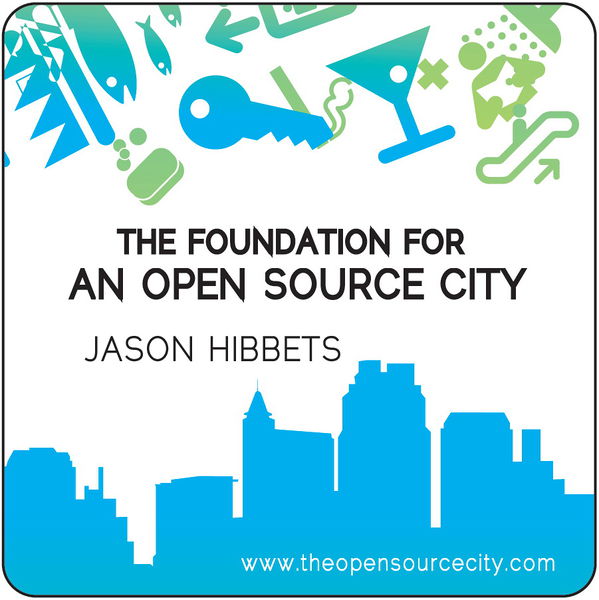Διαφορά μεταξύ των αναθεωρήσεων του «The foundation for an open source city by Jason Hibbets»
| Γραμμή 52: | Γραμμή 52: | ||
</td> |
</td> |
||
<td width="50%"> |
<td width="50%"> |
||
[http://theopensourcecity.com/ |
[http://theopensourcecity.com/ Το θεμέλιο για μια πόλη ανοιχτής πηγής] |
||
© Jason Hibbets 2013 |
© Jason Hibbets 2013 |
||
Αναθεώρηση της 14:42, 11 Νοεμβρίου 2014
|
|
|
|
The foundation for an open source city © Jason Hibbets 2013 ISBN: 978-1-300-92317-6 This work is licensed under a Creative Commons Attribution-ShareAlike 3.0 Unported License. To view a copy of this license, visit creativecommons First edition Published by Lulu 3101 Hillsborough Street Raleigh, NC 27607
|
Το θεμέλιο για μια πόλη ανοιχτής πηγής © Jason Hibbets 2013 ISBN: 978-1-300-92317-6 Αυτό το έργο είναι κάτω από μια Creative Commons Attribution-ShareAlike 3.0 Unported License άδεια. Για να δείτε ένα αντίγραφο αυτής της άδειας, επισκεφθείτε το creativecommons Πρώτη έκδοση Δημοσιεύθηκε από Lulu 3101 Hillsborough Street Raleigh, NC 27607
|
|
For the open source, open government, and open data communities
|
...
|
|
Contents
About the editors About the author References |
... |
|
Introduction
|
... |
|
Today, the citizen experience for many individuals includes, but is not limited to, voting, lobbying, and complaining about “government.” In the United States, the “government” includes citizens. For the people, by the people. But many of us let our busy lives and many times, politics, get in the way, distract us, or turn us off. |
... |
|
Think about your own experiences with government. How have you been disappointed? What could be better? How could your interactions be enhanced? |
... |
|
Our experience with government could be so much better. We have ideas on how to improve the communities we live in or fix a part of our government that isn’t working correctly or efficiently. But do we have the tools, knowledge, time, information, or access needed to make these improvements? |
... |
|
Improving the citizen experience means that your interactions with government are more participatory and collaborative. And that starts with having a more transparent, open, and inviting government. This book will explore Raleigh’s path to what I call an “open source city” and how the open government movement in Raleigh has accelerated over the last two years with the passing of an open government resolution, two successful CityCamp Raleigh events, and the forming of a Code for America brigade. |
... |
|
First, I will define the elements of an open source city and demonstrate how Raleigh has applied those characteristics. We’ll explore the open source culture, government policies, events, and economic development. Then we’ll take a look at how open government is applied and some of the things I’ve learned through my travels. |
... |
|
This book draws on my open government experience and includes articles I’ve written and interviews conducted for opensource.com–an online publication and community exploring how the principles of the open source development model are applied to disciplines such as business, education, government, health, law, and life. |
... |
|
I’ve been employed by Red Hat since 2003, gaining ten years of open source experience. I’ve worked on opensource.com, described as a community service by Red Hat, since the project launched in January 2010. I have many roles at opensource.com including project manager, content curator, community manager, contributor, and lead administrator. |
... |
|
Opensource.com aspires to publish all of their content under Creative Commons, and there are a number of articles and interviews originally published there that I've incorporated into this book. This book itself would not be possible without Creative Commons–a set of licenses that grant copyright permissions for creative works like this. |
... |
|
The purpose of this book is to tell Raleigh’s open source story and inspire others not only to participate, but to run with their ideas and improve our government. I want this story to be a catalyst for more open government, open data, and citizen participation, in Raleigh and beyond. |
... |
|
About the author Jason Hibbets is a project manager in Corporate Marketing at Red Hat. He is the lead administrator, content curator, and community manager for opensource.com and has been with Red Hat since 2003.He graduated from North Carolina State University, and lives in Raleigh, North Carolina where he has been applying open source principles to neighborhood organizations in Raleigh for several years, highlighting the importance of transparency, collaboration, and community building. In his spare time, he enjoys surfing, gardening, watching football, participating in his local government, blogging on southwestraleigh.com, and training his Border Collies to be frisbee and agility dogs. He heads to the beaches of North Carolina during hurricane season to ride the waves. Website: http://hibbets.net/ Twitter: @jhibbets Email: jason@hibbets.net |
... |
|
References
David Eaves is a public policy entrepreneur, open government activist, and negotiation expert advising government officials on open government and open data - http://eaves.ca/ Luke Fretwell is the Co-founder of GovFresh, which features public servant innovators, civic entrepreneurs and the ideas and technology changing the way government works - http://govfresh.com/ Alex Howard is the Government 2.0 Washington Correspondent for O'Reilly Media and covers open innovation, open source software, open data, and open government technology - http://radar.oreilly.com/alexh Steve Ressler is the Founder and President of GovLoop, a social network connecting over 60,000 federal, state, and local government innovators - http://www.govloop.com/ Center for Effective Government (formerly OMB Watch) -http://www.foreffectivegov.org/ CityCamp - http://citycamp.govfresh.com/ Code for America - http://codeforamerica.org/ Creative Commons - http://creativecommons.org/ Data.gov - http://www.data.gov/ E-Democracy.org - http://forums.e-democracy.org/ GovLoop - http://www.govloop.com/ Open Data Handbook - http://opendatahandbook.org/ Open Government - http://opengovernment.org/ Open Government Partnership - http://www.opengovpartnership.org/ Opensource.com - http://opensource.com/ Sunlight Foundation - http://sunlightfoundation.com/ The Open Knowledge Foundation - http://okfn.org/ The Open Source Initiative - http://opensource.org/ We the People - https://petitions.whitehouse.gov/ |
... |
